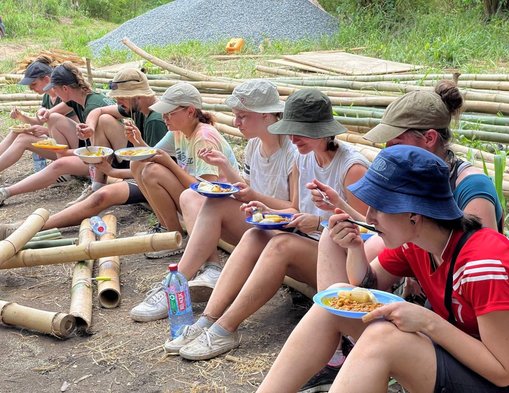LATEST NEWS
Green building in Ghana
Construction site of the bamboo training center © Project team Klimagerechtes Bauen | Hochschule RheinMain
Seventeen students of the Faculty of Architecture and Civil Engineering of the RheinMain University of Applied Sciences (HSRM) recently spent two weeks in Ghana. Under the guidance of Professor Sascha Luippold and lecturers Christoph Diekhans and Jan Glasmeier, they completed a hands-on workshop on climate-friendly building. The field trip was the highlight of an international project spanning several semesters and focused on building an exemplary bamboo training center using eco-friendly materials.
Cooperative start of construction for socially sustainable bamboo training center
Three semesters of preparation preceded the international excursion. These included developing and planning cooperative concepts and seminars on climate-friendly building in sub-Saharan Africa, as well as a Design Build Summer School on building with clay and bamboo at the Kurt-Schumacher-Ring Campus. To apply the acquired knowledge and skills under real-life conditions in another climate zone, 17 students from the bachelor’s and master’s degree programs in Architecture, Civil Engineering and Architectural Heritage Conservation traveled to Somanya. Together with the Ghanaian partner organizations Bamboo for Integrated Development Ghana, Advocates for Biodiversity Conservation and the International Bamboo and Rattan Organization, the German NGO Grow Colourful Ghana e. V. and the local population, the students began the first construction phase of a longer-term project for a bamboo training center. The workshop focused on sharing experiences on building with renewable and climate-positive materials between cultures as well as initiating the socially sustainable education project on site.
The plan is to built a bamboo training center in several construction phases. When completed, it will comprise various functional areas and several types of buildings, including a campus with guest houses, workshops and training buildings, as well as infrastructure facilities. The goal of the project is the local establishment of a continuous value chain of renewable materials ranging from the bamboo cultivation to treatment and processing to building craft. In addition to its ecological impact, the project creates economic prospects in rural southeastern Ghana.
Site setup and first stage of construction
To kick off the project, HSRM students created temporary restrooms and shade canopies as part of the site installation. Together with locals, they carried out preparatory earthworks. Buildings were then surveyed and foundations concreted, mud bricks made, and bamboo treated to make it last longer. For the bamboo treatment with salt, a dipping basin had been concreted in advance, which could be used directly for the site’s building material. The first stage of construction of the training center began with two practical buildings, a compost separation toilet and the workshop for bamboo treatment. In the process, the students had the opportunity to apply various techniques of clay building and bamboo processing.
“In addition to the shared building experiences, cultural exchange was also a key element of the workshop. While cooking together in a simple field kitchen, the students learned about typical Ghanaian dishes and local preparation methods. Shared meals often led to in-depth conversations or improvised group games – all those involved on all levels will remember the workshop as incredible success,” summarized Prof. Luippold.





